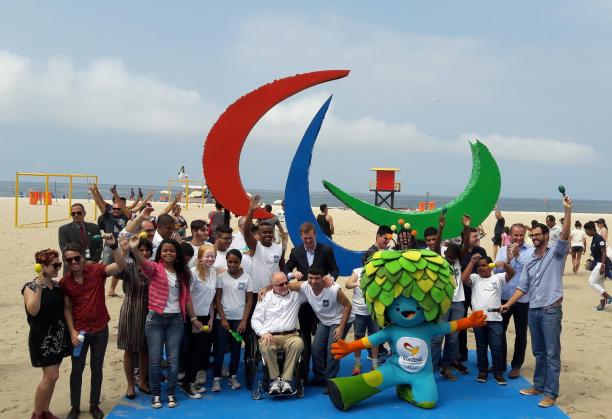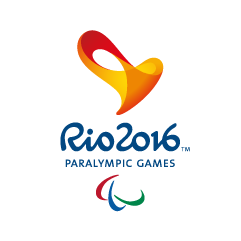Agitos sculpture unveiled on Copacabana
02.09.2016The Agitos symbol – made of recyclable plastic to combine concepts of sustainability, inclusiveness and interactivity – was set up for the Rio 2016 Paralympics.
 The Paralympic symbol - Agitos - was unveiled on Copacabana Beach before the start of the Rio 2016 Paralympic Games.
© • IPC
The Paralympic symbol - Agitos - was unveiled on Copacabana Beach before the start of the Rio 2016 Paralympic Games.
© • IPC
After the success of the Olympic rings on the most famous beach in Brazil, it was time for the Agitos to take over Copacabana Beach prior to the Rio 2016 Paralympic Games (7-18 September). The sculpture of the Paralympic symbol was unveiled by the City of Rio on Friday morning (2 September) on Copacabana Beach outside Copacabana Palace Hotel. Just like the rings, the Agitos are to be made of recycled plastic – a work of art four metres high and three metres wide. They will also have different textures and smells, thus being a source of inclusion and interactivity.
"Once again we are combining art, education and sustainability to convey a message that we need to pay attention to the amount of waste we produce and how we discard it," said Joaquim Monteiro, President of the Municipal Olympic Company.
The Agitos were made by producer and artist Elisa Brasil, who was also responsible for building the Olympic rings previously displayed at Copacabana. She partnered with scenic designer Tejota Bastos to create a piece of work that can sharpen our senses. The blue Agito, for example, had its outside made with canvas and the inside made with bottles of fabric softener, so it gives off a "smell of clean" that can be easily identified. Other colours will also bring out different aromas and special sensations.
The artists' recycling technique involves shredding, heating and pressing the plastic to form a new plate that makes up the base of each Agito. PET (polyethylene terephthalate) bottles are reused to fill the sculpture's base and add more sturdiness to all parts, which were built together. The plastic was collected across the city by municipal school students with the support of the City Hall and non-governmental organisation Eccoponto. Through the Transforma Project, pupils got to learn about and follow the creation process.
Brasil and Bastos were hired by the Dutch social enterprise Dopper, famous across the globe for their work on recycling plastic and raising awareness of the impact on the planet caused by the use and improper disposal of plastic.
"Dopper is proud to be part of an authentic project that seeks to both include and educate. We were happy to achieve a result that addresses the issue in a fun and interactive way," said Ellen Sluis, Dopper ambassador in Brazil.
Elisa also celebrated the partnership: "We believe this sculpture fulfills its role of sending our message to the world."
The Agitos sculpture is accessible to the public and located in one of Rio's main tourist spots. It has what it takes to become a social media hit, just like the Olympic rings, the pyre at Candelária and the hashtag #CidadeOlímpica.
__
Sport fans from around the world can now buy their Paralympic tickets for Rio 2016 from authorised ticket resellers (ATRs)
The IPC’s Global ATR is Jet Set Sports, and Rio 2016 tickets and packages can be purchased on the CoSport website.
Residents of Brazil can buy 2016 Paralympics tickets directly from the Rio 2016 website.
Visa International is the exclusive payment card and the official payment system for the Paralympic Games.





















